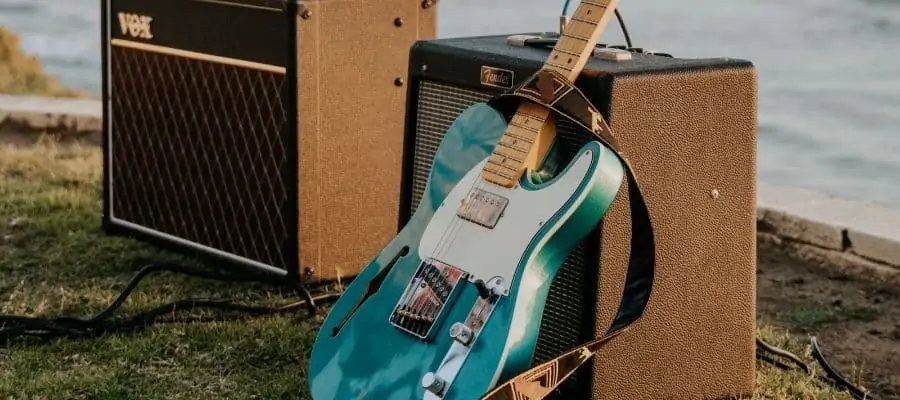Electric guitars are versatile, aesthetically pleasing, and ideal for playing in bigger venues when an acoustic instrument wouldn’t cut it. If you’re a guitar enthusiast, chances are you’ve watched your all-time favorites (Jimi Hendrix, Eric Clapton, and Jimmy Page) perform some of their most memorable performances on an electric guitar, and getting to play one yourself is a one-of-a-kind experience. However, can an electric guitar shock you?
An electric guitar can shock you if not properly grounded. When you touch the guitar’s strings while plugging it into an amplifier, electricity can flow through its body and cause a shock. However, the risk of this happening is pretty low, especially if you take the right safety measures.
If you want to learn more about the instances in which your electric guitar becomes a safety hazard, as well as some of the best ways to protect yourself, make sure to read on. Though the risk of getting shocked by an electric guitar is low, being aware of potential dangers and their respective solutions can make a world of difference.
When Can an Electric Guitar Shock You?

A wide array of variables can contribute to a potential electric shock. While many of these can be dangerous, when you combine them, they can quickly turn lethal. So, let’s explore some of the instances in which an electric guitar can shock you:
- Excessive humidity: Playing an electric guitar in wet conditions (outside during rainfall or near a water source) is a recipe for disaster. The moisture in the air will increase the conductivity of the strings, making it easier for electricity to travel from the instrument to your body.
- Grounding issues: As I briefly mentioned in the answer snippet above, electric guitars generally become shock hazards when they’ve not been grounded properly. In this case, there’ll be a static electricity buildup that’ll shock you as soon as you touch the strings.
- Faulty wiring: Ensuring your entire setup is in optimal condition before starting a session can prove to be life-saving, as faulty wiring can cause an electrical short circuit that often leads to shock.
- Faulty equipment: Even when the wires aren’t the problem, sometimes the very equipment you use can be dangerous. For example, old or damaged guitars and amplifiers increase the risk of an electric shock.
- Low-quality effect pedals: Effect pedals often create a high level of voltage that can easily travel to the instrument and, in turn, you as well. So, always be extra careful when using them and turn them down when you’re not playing.
Given that it’s not always easy to detect when there’s something wrong with the wiring or the equipment you’re using, it’s always best to be on the side of safety and avoid touching any metal components with your bare hands.
These include the bridge, the tuning pegs, and so on. If that doesn’t seem feasible, don’t worry. You can take plenty of other preventive measures instead, so let’s explore them more in-depth.
How To Protect Yourself

Though the risk of getting shocked by an electric guitar is pretty low, it doesn’t hurt to minimize that risk as much as possible by following a few basic safety guidelines. Here’s what you can do.
Make Sure the Equipment You Use Is in Good Condition
As mentioned above, faulty equipment presents an increased risk of electric shock, so you should regularly conduct check-ups on your guitar and amp to ensure they’re properly maintained and safe to use. If you’ve been playing long enough, you can easily detect a potential issue by making a visual inspection or playing a few notes.
If You Feel Any Unusual Sensations While Playing, Stop Immediately
This is an essential safety precaution that many musicians mistakenly ignore in favor of a great session. However, I can’t stress enough how important it is to stay present throughout your set and beware of the signs that might indicate a potential problem.
For example, if you feel any unusual sensations while playing, such as tingling or numbness, immediately stop what you’re doing and either check your equipment yourself for any issues or take it to be looked at by a professional.
Use a Surge Protector
As the name suggests, a surge protector protects your equipment from any electrical surges or voltage spikes. As a result, you can rest assured that if anything goes awry, your guitar will simply stop working instead of transmitting excess levels of electricity to your body, thus becoming a serious safety hazard.
Use a Grounded Outlet
The outlets you choose for your guitar and amplifier need to be grounded. These types of outlets usually have three prongs that connect to a grounding wire, the goal of which is to prevent electric shocks from occurring. Moreover, always make sure to use the proper equipment for your desired purpose.
Avoid Playing in Humid Conditions
Since I explained why excessive humidity could be dangerous in this instance, you already know why this measure is important. If you do happen to get your guitar wet, stop playing immediately and try to dry it as thoroughly as possible.
Then, make sure to do a close inspection (ideally, you’d want to enlist the help of a professional to do that) to see if there’s any damage you need to address.
Wear Rubber-Soled Shoes
Last but not least, always remember to wear rubber-soled shoes. These act as a last line of defense, as the material helps insulate your body from electric shocks. For the same reason, it’s best to avoid playing an electric guitar barefoot or wearing leather-soled shoes – these are great electricity conductors.
Conclusion
An electric guitar can shock you; however, as long as your equipment is in good condition and properly grounded, the chances of that happening are pretty low.
Still, it’s best to be on the side of safety and implement as many of the tips and tricks outlined above as possible. Keeping potential hazardous scenarios in mind can also make a world of difference when it comes to maintaining your safety, so always consider whether you’ll be facing any of them in your upcoming session before planning it – your health should always be of the utmost priority.
If you found this article useful, you may want to save this pin below to your Guitar board.

Recent Posts
When learning new songs have you noticed that some of the chord sequences sound really good? But when you tried to come up with your own chord sequence, or as we call it chord progression, you found...
Some guitarists insist on buying an expensive amplifier with their electric guitar. They assume that this is a must for every type of guitarist out there. However, in some situations, this isn’t...

